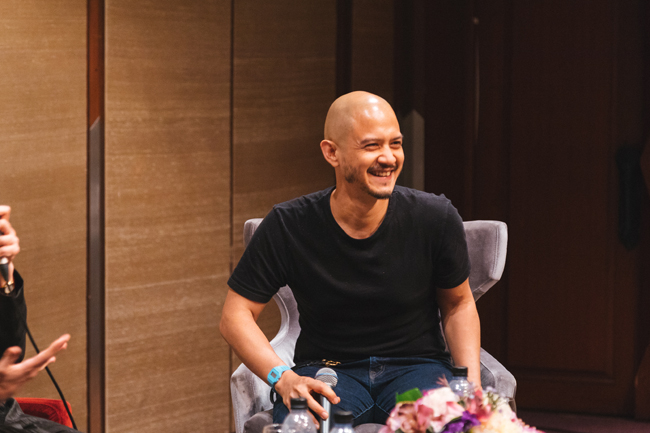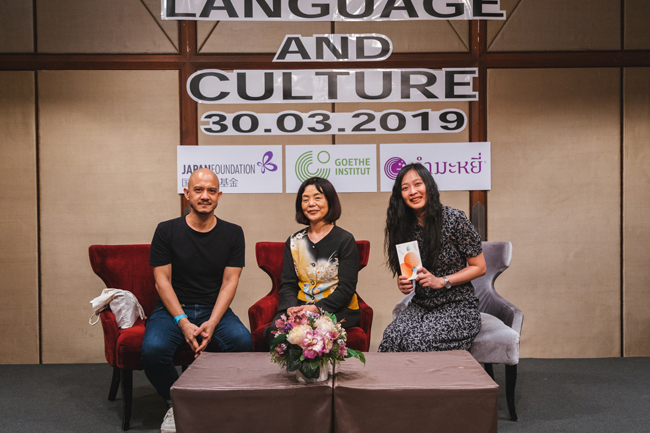Culture, Languages and Politics
Thipsamritkul: What about the relationship between you and your Japanese readers? Because you live far away and you also write in Japanese, and I also saw some reviews that the Japanese readers are very impressed with how well you depict the current Japanese society. Some even say they could not believe that you do not actually live in Japan.
Tawada: If I had lived in Japan, I would not want to know too much about it. But because I live far away, I am always thinking about Japan―there is that sense of longing.

Yoon: That is true, especially during the time when there is an ongoing social or political situation. I think it is almost easier to find information about the situation when you are abroad.
Tawada: Yes. Take the Fukushima nuclear station disaster, for instance. The German newspapers wrote so much about it. There was also information which you could not get in Japan or the United States.
Yoon: Was there censorship in Japan during that time?
Tawada: Not direct censorship, but something along the line. The liberal newspapers in Japan were very careful about what they were writing. They wanted to be critical, but if they make the smallest of mistakes, there would be so many attacks from the other side. So in the end, they could not really write much about it.
Thipsamritkul: And did many people talk about it?
Tawada: No. Not only because of censorship, but it was also depressing to talk about the situation in Japan. Japanese people do not like discussing these things. German people, on the other hand, they are always very happy to openly discuss and criticize things.
Thipsamritkul: Perhaps because in Japan, there are so many things that you are not comfortable to talk about, even with friends. In Germany and Europe, however, people tend to discuss these issues more openly. Do you think it is because of the linguistic influence which you mentioned earlier, about how people do not really state things directly in Japanese?
Tawada: I think it is more of a cultural thing. In Germany, it is considered a very positive thing to be discussing something critically. In Japan, if you criticize something, even the government, you are perceived as hostile and problematic. That is why it can be uncomfortable to criticize somebody in Japanese. What about in Thailand?
Yoon: I think it is quite similar to Japan. There are subjects that are considered sensitive in Thai culture. That being said, sometimes people discuss these things quite openly when they are abroad. I do not think it is just about the language as it is almost about security. It is like you feel more secure to discuss or to share and express your feelings when you are physically removed from the situation.
Thipsamritkul: In a way, it is easier to talk about sensitive or untouchable subjects by comparing or expressing them through literary works and films that explore the same issues.
Yoon: Yes, I think that art plays a very universal role here. A scene with social or political commentary in a Hollywood film may be shown anywhere, but that same scene in a Thai movie, and you would perhaps be prohibited from showing it. So there is that kind of privilege of being a foreign product. The same applies to literature. In The Emissary, there are some parts where you talk about the authoritarian state and democracy, and it was quite strongly expressed through the opinion of your character. If somebody had written that in Thai, they could get attacked by those who oppose the view. However, if I say that it was a translation of a work written by Yoko Tawada, nobody would blink an eye. In that sense, it is like I can use you as an excuse for my own expression. Speaking of politics, as a writer, do you feel that you have to have a particular view on politics? Do you feel a responsibility to have political elements in your work when you write?
Tawada: I am not interested in politics, but at the same time, I cannot merely ignore them. When I write novels, I do not really think about politics, but there are things that are so important for us as human beings that I simply cannot ignore. I occasionally write essays for newspapers, and while I do not really criticize the Japanese government, I will often write about the things that are going on in Germany just to show the Japanese readers that there are alternative ways of doing things.
Between Language and Culture
Tawada: Sometimes when I write in German, in my head, I think both in German and sometimes, part German and part Japanese. So the German words are based on a Japanese thinking. So that's a variation of German that has been mixed with another culture. On the other hand, my Japanese has also changed after I started writing in German. The work produced is still in Japanese language written by a Japanese, but through the medium of someone who has experienced another language, the Japanese that I write becomes mixed with another (German) language. It becomes a mix.
Thipsamritkul: Languages can definitely be mixed. Perhaps not written out in the exact same form, but the structure and the way the words are combined reflects the integration of different languages. For instance, I find myself having a different grasp of the Thai language after I started learning English as the two languages have a very different system and structure.
Yoon: I also think that languages do mix. I do not think that there is one language that is purely made up by one culture. The languages have always been mixed and influenced by different cultures and other languages themselves. In Thai, one sees the integration of the Bali Sanskrit, while English also its roots in Latin etcetera. With Japanese, too, one can see its relation to the Chinese language. A culture is a mixture of different historical and cultural context. Languages evolve over time―they are influenced by the different cultures as they are used and translated across different languages.

[On March 30, 2019 at Queen Sirikit National Convention Center (Bangkok)]
Photo: Teeraphan Ngowjeenanan







